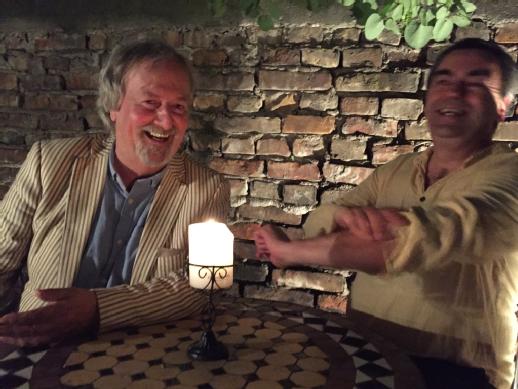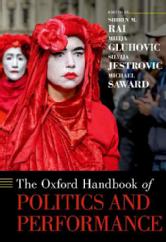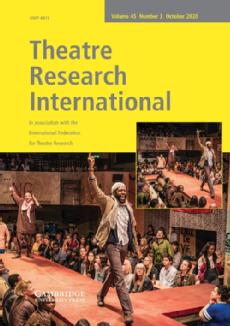Theatre & Performance Studies News
In Memoriam - Professor Jim Davis
 It is with a very heavy heart that we write to let you know that Professor Jim Davis passed away on Saturday 4th November following a stroke. Everyone who had the pleasure of encountering Jim will appreciate that this is a huge loss for his family, friends, colleagues, collaborators and the wider research community. He was a fantastic scholar and unwavering champion for the discipline and theatre historiography. He was such an important part of the Theatre and Performance family at the University of Warwick and will be missed for his leadership, mentorship, friendship and unfailing sense of fun and mischief.
It is with a very heavy heart that we write to let you know that Professor Jim Davis passed away on Saturday 4th November following a stroke. Everyone who had the pleasure of encountering Jim will appreciate that this is a huge loss for his family, friends, colleagues, collaborators and the wider research community. He was a fantastic scholar and unwavering champion for the discipline and theatre historiography. He was such an important part of the Theatre and Performance family at the University of Warwick and will be missed for his leadership, mentorship, friendship and unfailing sense of fun and mischief.
Jim Davis joined Warwick in 2004 as Head of Department (2004-2009) after eighteen years teaching Theatre Studies at the University of New South Wales in Sydney, where he was latterly Head of the School of Theatre, Film and Dance. In Australia he was also President of the Australasian Drama Studies Association and member of the Board of Studies of the National Institute of Dramatic Art. Prior to leaving for Australia he spent ten years teaching in London at what is now Roehampton University. He co-organised many conferences including for the International Federation of Theatre Research (IFTR) in New South Wales and at Warwick. He convened Historiography Working Groups for both IFTR and for TaPRA. He served as an editor for the journal Nineteenth Century Theatre and Film.
He published widely and with considerable critical acclaim in the area of nineteenth-century British theatre. His most recent bookComic Acting and Portraiture in Late-Georgian and Regency England (2015) won the TaPRA David Bradby Prize for Research in International Theatre and Performance in 2017 and was shortlisted for the 2015 TLA George Freedley Memorial Award. His other publications include Theatre & Entertainment (2016), Dickensian Dramas: Plays from Charles Dickens Volume II (2017) and European Theatre Performance Practice Vol 3 1750-1900 (editor, 2014). He was also joint author of a study of London theatre audiences in the nineteenth century Reflecting the Audience: London 1840-1880 (2001), which was awarded the 2001 Theatre Book Prize. He contributed numerous chapters including essays on nineteenth-century acting to the Cambridge History of British Theatre and on audiences to the Cambridge Companion to Victorian and Edwardian Theatre. He also published many articles in Theatre Journal, Theatre Survey, Theatre Notebook, Essays in Theatre, Themes in Drama, New Theatre Quarterly, Nineteenth Century Theatre, Theatre Research International and The Dickensian. He was also responsible for many of the theatrical entries in The Oxford Readers' Companion to Dickens and contributed to the Oxford Encyclopaedia of Theatre and Performance, The Cambridge Encyclopaedia of Stage Actors and Acting and the New Dictionary of National Biography. For several years he wrote an annual review of publications on nineteenth-century English Drama and Theatre for The Year's Work in English Studies.
An event to celebrate Jim’s life and work was held on 6 January 2024 12pm-4pm in the Studios in the Faculty of Arts Building on the University of Warwick's campus.
Oxford Handbook of Politics and Performance Published
 Congratulations to Prof. Silvija Jestrovic and Dr. Milija Gluhovic on the publication of the their Oxford Handbook of Politics and Performance.
Congratulations to Prof. Silvija Jestrovic and Dr. Milija Gluhovic on the publication of the their Oxford Handbook of Politics and Performance.
Prof. Silvija Jestrovic has been appointed as Senior Editor for Theatre Research International
 Congratulations to Prof. Silvija Jestrovic who has been appointed as Senior Editor for IFTR's (@iftrcomms) Theatre Research International (@theatreintl). Theatre Research International is the leading academic journal for Theatre and Performance Studies scholars. It publishes articles on theatre practices in their social, cultural, and historical contexts, their relationship to other media of representation, and to other fields of inquiry. The journal seeks to reflect the evolving diversity of critical idioms prevalent in the scholarship of differing world contexts.
Congratulations to Prof. Silvija Jestrovic who has been appointed as Senior Editor for IFTR's (@iftrcomms) Theatre Research International (@theatreintl). Theatre Research International is the leading academic journal for Theatre and Performance Studies scholars. It publishes articles on theatre practices in their social, cultural, and historical contexts, their relationship to other media of representation, and to other fields of inquiry. The journal seeks to reflect the evolving diversity of critical idioms prevalent in the scholarship of differing world contexts.
Applications are now open for an Associate Editor to work alongside Silvija for the duration of her tenure from 2021 to 2024.
Nicolas Whybrow's Urban Sensographies is Published
Congratulations to Nicolas Whybrow, whose book, Urban Sensographies, has just been published by Routledge.
Find out more about the volume here: https://warwick.ac.uk/fac/arts/scapvc/theatre/staff/nicolas_whybrow/urban_sensographies/
Julia Peetz to edit issue of Performance Research 'On Protest'
Julia Peetz is editing an issue of Performance Research 'On Protest' with former Head of Department, Prof. Andy Lavender. Their call for papers is out and can be found below:
Storming the Capitol. Dismantling Confederate and slave trader statues. Refusing to wear a mask. Booing Belarusian President Alexander Lukashenko. Sabotaging 5G towers. Buying stamps in an attempt to prop up the United States Postal Service. Defying lèse-majesté laws to criticize Thai royalty. Writing ‘Black Lives Matter’ on roads, so large that the message can be read from Earth orbit. All these actions have been performed as protests in 2020 and 2021, marking this as a year of significant dissent. In the United States alone, the Black Lives Matter actions may be the largest protest movement in the country’s history, eclipsing even the protests of the civil rights era. The US presidential election, meanwhile, was a site for trenchant protests that dramatize the situation of commitment-amid-division that protest typically represents—and that beg wider questions of protest as a contemporary mode of political insistence.
While many of the recent protests around the world mark a resurgence of the popular voice, the language of resistance and opposition has become ubiquitous on the political right as well as for progressives. Right-wing populists paint themselves as perennial outsiders, embattled by and protesting against deep state powers and global cabals. Protestors have weaponized ideals of personal freedom to rage
against COVID-19-specific health guidance regarding the wearing of face coverings in public. Social media are increasingly sites of and means of coordinating protest actions; even so, social media posts framed as protest actions are frequently denounced as merely ‘performative’ forms of protest and allyship. Debates on the correct and most effective manner of performing protest abound, and once-controversial civil rights heroes are invoked as exemplars of ‘right’ and ‘wrong’ ways to protest. Protest has mainstreamed, and it has become more volatile. It belongs not to any single faction or persuasion but has become pervasive—even while it is fostered as part of the repertoire of political sway, a system-theatre of power.
This issue calls for critical examinations of contemporary performances of protest across the globe. It is interested in ways that protest can be understood as theatre, but more particularly—in a multimodal, interconnected environment—as a form of public manifestation that draws upon a wide repertoire of representational devices. It seeks to address the relationship between embodied action, affective presence, communication and ideological affiliation. How does protest feel, and who is doing the feeling? It considers the performativity of protest. It pays particular regard to the extent to which protest achieves change (however this is defined) and the ways in which historical protests help to inform judgements of the conduct, legitimacy and efficacy of current protest actions. What historical instances are invoked to draw comparisons to current forms of activism and resistance? How do contemporary protests draw on historical repertoires of protest that reflect or extend beyond their specific political contexts? Do protest strategies and tactics need to evolve as languages of protest become a default mode of mainstream political discourse? Our concern with the modal nature of protest, we suggest, might also be historicized. What is it about our times, our modes of communication, our political systems, that help to produce protest as a defining feature of contemporary political process?
We invite contributions in the form of longer essays (up to 7,000 words), shorter provocations (2,000 words) and artist pages. We also welcome suggestions for unique or hybrid formats.
Contributors may wish to draw on the following list of topics as a source of inspiration, although the list is not intended to be exhaustive or restrictive.
- Staging/Representation of protest in mainstream media
- Contemporary theatres of protest
- Violent and non-violent protest
- Criteria for the efficacy of protest
- The triviality and ubiquity of protest
- Populism and protest
- Protest and the political right
- Protest and the political left
- The protestor as actor
- The affective nature of protest
- Protests and conspiracy theories
- Hyperbole and protest
- Social media and the performance of protest
- Performative protest/Performativity of protest
- Collective/Cultural memory of protest
- Protest and national identity
- Heroes of past/present protests (and their representation)
- Protest in the social sciences versus protest in the humanities
- Protest and change
- The purpose of protest (thinking of performance
Schedule:
Proposals 8th March 2021
First Drafts July 2021
Final Drafts September 2021
Publication Jan/Feb 2022
ALL proposals, submissions and general enquiries should be sent direct to the PR office: info@performance-research.org
Issue-related enquiries should be directed to the issue editors:
Andy Lavender (andy.lavender@gsmd.ac.uk )
Julia Peetz (julia.peetz@warwick.ac.uk )
General Guidelines for Submissions:
- Before submitting a proposal we encourage you to visit our website (www.performance-research.org ) and familiarize yourself with the journal.
- Proposals will be accepted by e-mail (MS-Word or RTF). Proposals should not exceed one A4 side.
- Please include your surname in the file name of the document you send.
- Submission of images and visual material is welcome provided that all attachments do not exceed 5MB, and there is a maximum of five images.
- Submission of a proposal will be taken to imply that it presents original, unpublished work not under consideration for publication elsewhere.
- If your proposal is accepted, you will be invited to submit an article in first draft by the deadline indicated above. On the final acceptance of a completed article you will be asked to sign an author agreement in order for your work to be published in Performance Research.
